Ancient mythology has much to teach us about grief and mortality. In this post, I take you an adventurous journey into a 5000-year-old story from Mesopotamia. This myth begins with listening.
“From the Great Above she opened her ear to the Great Below.”[i]
The one opening her ears is Inanna, the Great Goddess of Heaven and Earth (~3500 – 1500 BCE, Sumeria/Mesopotamia). Her story is the oldest written goddess myth, and what a goddess she is: Erotic, wise, powerful, conniving, loving, fierce, courageous, and ruthless.
In the Sumerian language, the word for ear also means wisdom. Inanna is called to listen to the Great Below, the realm of dream, death, depression, and the unconscious, because she seeks wisdom. Without knowledge of loss and mortality, she is not whole.
When my husband Vic was diagnosed with cancer in 2006, I knew I had to listen. I bought a notebook and recorded my experiences from medical to psychological, from hope to anguish, from spiritual peaks to deep despair. I wanted to remember everything. I needed to find meaning.
After Vic’s death, exhausted and disoriented, I faced Death’s companion, Grief. I listened again.
In her Descent to the Great Below, Inanna tells the gatekeeper that she wishes to attend the funeral of Ereshkigal’s husband. Inanna’s sister Ereshkigal is the Death Goddess. Inanna intends to witness a death, not face her own. I understand. She arrives in full queenly regalia at the gates; I had arrived in the oncologist’s office with my notebook, my list of well-informed rational questions, my suggestions, and my fierce resolve.
When Death won, my personal descent began.
As Inanna passes through each of the gates on her way to the Great Below, she is stripped of a garment or jewel symbolic of her power.
When she (Inanna) entered the first gate,
From her head, … the crown of the steppe, was removed.
Inanna asked: “What is this?”
She was told: “Be quiet, Inanna, the ways of the underworld are perfect. They may not be questioned.”[ii]
Hadn’t I given up enough? Apparently not.
As long as Vic lived, I knew my position in the family and community. After his death, I lost my role as wife, partner, and lover and was labeled “widow,” a word that made me cringe. I had been a women’s health counselor, but lost my motivation. My erotic life disappeared—not only sexual, but daily intimacy. My journal felt useless. I was stuck in grief. Like Inanna in the Underworld, I was “naked and laid low.”
When Inanna reaches the Great Below, she is pronounced guilty for refusing to honor a power greater than her own. Then, she is hung on a hook. In this alarming image, similar to the much later image of the crucified Jesus, worldly abilities and powers are useless. Even this powerful Goddess is stripped and helpless.
So there they are, in the dust and darkness of the Great Below. Ereshkigal cries out in rage and pain. Inanna hangs on her hook. All is dark depression and stasis. There is no hope.
Are there divine forces that can save Inanna and us?
Ninshubur, Inanna’s trusted advisor, gets help. Enki, the God of Wisdom, creates two tiny beings from the dirt under his fingernails. These “insignificant” mourners have one skill: empathy. They witness the suffering of the Death Goddess and mirror her cries.
“Oh! Oh! My inside!”
“Oh! Oh! Your inside!”
“Oh! Oh! My outside!”
“Oh! Oh! Your outside!….”[iii]
The mourners provide compassionate mirroring. As in therapy or friendship, empathy transforms. Ask the Dalai Lama what power is equal to Wisdom. He’ll say Compassion.
Ereshkigal, the unloved and shunned, grieves for her husband, but we now learn that she is also crying out from the pain of giving birth. Within the deep unconscious darkness, something new is being born. Perhaps Inanna. Perhaps you and me.
Ereshkigal asked (the mourners):
Who are you,
Moaning—groaning—sighing with me?
If you are gods, I will bless you.
If you are mortals, I will give you a gift.[iv]
The mourners don’t want all the riches and resources of the world. They only want the corpse which they sprinkle with the Water and Food of Life.
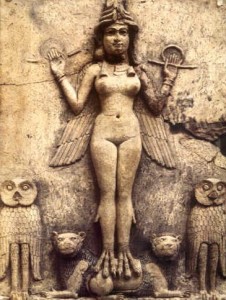
Inanna after her return with powers of Heaven, Earth, and Great Below (~1800 BCE, Burney Relief, wikimedia)
A sliver of light penetrates the Dark Unconscious and releases new energy. Birth will follow death. Spring will follow winter. The Goddess of Heaven and Earth rises and the cycle of life goes on.
As Inanna ascends, there are complications. Aren’t there always? There is no end to death and trauma, but there is also no end to compassion and rebirth.
I returned to life, lost and humbled, displaced and dismantled, even though I consciously knew loss was everyone’s destiny. My fertile forest, the kind mirroring of those who witnessed me, and a search for meaning became my water and food of life. I bowed to Inanna’s wisdom and Ereshkigal’s necessity knowing that death and destruction fuel a new cycle of life.
We descend, not because we want to, but because we must. In many ancient myths, descent is an integral part of the Great Feminine Round of Life and Death. We are mortal and vulnerable. We live in a world of catastrophe and chaos, personal loss and social threat.
We are thrown down. We are helped up. Miraculously, we find our way to life again.
***
With gratitude to my sister mythological explorers. Our small group has studied ancient feminine traditions for nearly thirty years. Without our gatherings, I would not have dug as deeply or taken this so much to heart. I’m also grateful for the careful scholarship, engaging story-telling, and original images used by Diane Wolkstein and Samuel Noah Kramer in their book Inanna: Queen of Heaven and Earth.
For one of my most well read articles about mythology, see Have They Forgotten They Are Mortal? Lessons from Hecate. You’ll also enjoy Jean Raffa’s article Inanna: Myth of Descent. As opposed to our culture’s interest in ascent myths of heros and conquerers, myths of descent teach us how to survive and grow when we lose what is precious to us.
[i] Diane Wolkstein and Samuel Noah Kramer, Inanna: Queen of Heaven and Earth, Harper and Row, 1983, p. 52.[ii] Ibid, p. 57.
[iii] Ibid, p. 65.
[iv] Ibid, p. 66.
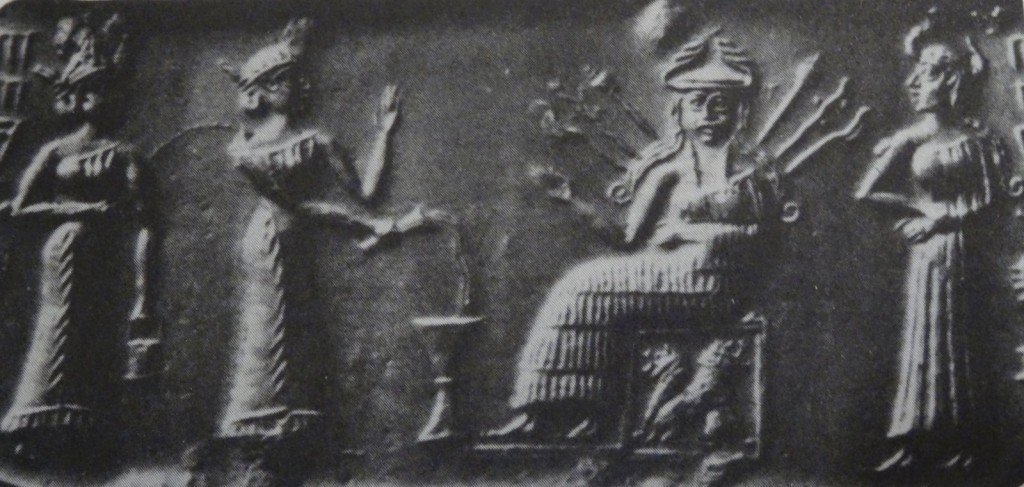
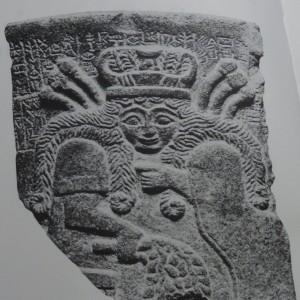
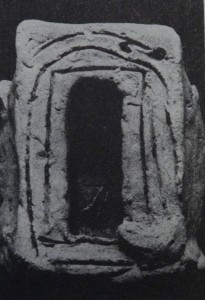
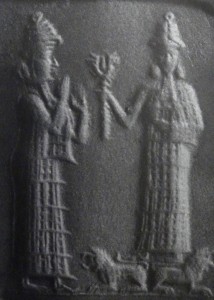
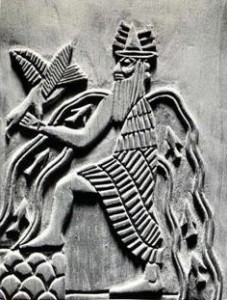
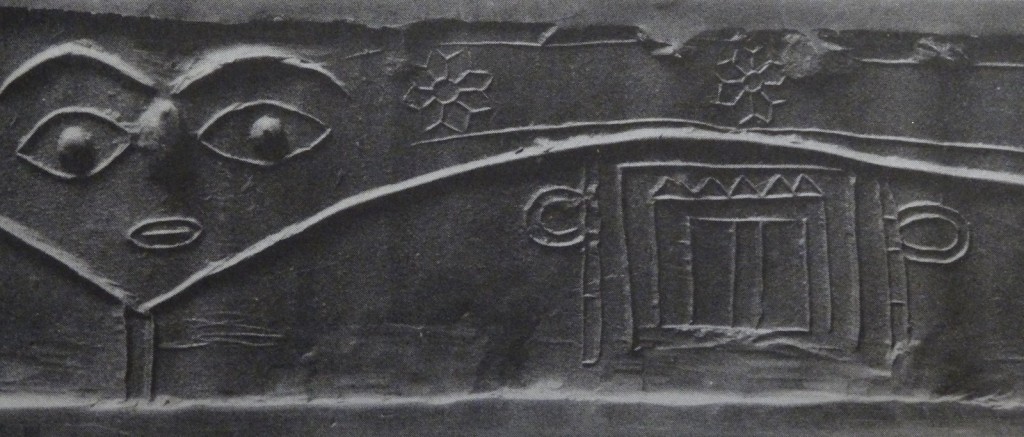
Whenever I read your posts, certain lines jump out at me. This time is was “grief is death’s companion.” I just finished reading poet Donald Hall’s The Best Day the Worst Day in which the ordeal of his wife Jane Kenyon’s death is told with heart-breaking yet exquisite story-telling. I know I referred to it when I commented on your last blog post, but it is still reverberating in my mind.
I found it interesting that in the Sumerian language, the word for ear also means wisdom. In Christian terms, the ear is the gateway to wisdom also, for “faith cometh by hearing and hearing by the word of God.”
Your knowledge of mythology is mind-blowing, Elaine, and I enjoy the well chosen frieze panels. I hope you don’t think me disrespectful when I say that Inanna is very curvy! You are very well prepared for the lectures and workshop in Sarasota, where I hope the weather will be agreeable.
Marian, in the middle of the night, I woke up feeling I had named this post poorly. It should have been something like “What a 5000-year-old Goddess story taught me about grief” to give people a clue of why this material is interesting. Thank you for being a curious reader. I ordered Donald Hall’s book with your recommendation–and have no idea how I’ll ever get through these piles of books. This one sounds irresistible.
There are so many similarities with biblical stories and images and these more ancient stories from the same part of the world. The flood, for example. And then “in the beginning was the word.” And the crucifixion and rebirth. As I said in the post, “myth” is a name we give someone else’s religion.
Inanna is curvy all right, and she wouldn’t find that disrespectful. I didn’t discuss the many other existing texts about her, especially her younger sexy self looking for a husband to plow the fertile fields. She praises her body and one of her images is a storehouse where the bounty of the harvest is kept. There are a few remaining reliefs of her in naked embrace with her husband. So, among other things, she is the goddess of the cycles of life, rejoicing in the fertility that make a culture continue forward.
Just yess. To all of this. Thank you for sharing this, my sister.
Thanks for your enthusiastic response. Be well.
Leste et sted at Maria ble besvangret gjennom øret. Det blir ikke så mange fysiske kroppslige forandringer av det. Hva er da Jesus? Er han en mental endring som etter hvert fødes i oss til en mental og åndelig opplysning til visdom?
I couldn’t get a translation of this, so sent an email asking the writer to translate his words. He wrote this: “The translation from english to norwegian has been so good that i often don’t notice the small differences in the translation. Thats why I wrote i norwegian. Of course i can translate it to english. And thank you for the story about Inanna and listening to the dark.
«In some place, i once read that Maria got pregnant through her ear. That pregnancy don’t give many physical implications. So what about Jesus? Is he a mental change that is born inside us as a mental and spiritual enlightenment to visdom?”
I think I read about it in Gandy and Freke, The Jesus mysteries. Was Jesus a pagan god? This and other things have been a issue for me in many years. First, for many years ago, it was about the cathars in south France. An so Jung, norwegian fairy tales and mythology in many ways.”
Thanks, Jeppe, for commenting and then translating. I agree that the pregnancy of Mary has few physical implications. For me, the Virgin Birth leaves body out of the sacred realm whereas I see the body as a sacred miracle. I can’t answer your other questions, but maybe someone else can.
It was lovely to read this again Elaine – I know I read it some while back and commented then. It will never lose its fascination, or its reality and grimness … and its wisdom of destruction and creation belonging to each other; that one needs the other and each enhances the other. Thank you.
Yes, you did read and comment on the earlier version at Mindfunda. I felt the story also belonged here on my website and this was a good time to post it. Thank you, Susan.
Dear Elaine, Yours is a superbly rich and insightful article for me to re-read this afternoon. I very much enjoyed it first time around at Mindfunda and as I recall, it greatly encouraged me to dig out my copy of “The Descent to the Goddess; A Way of Initiation for Women” by Sylvia Brenton Perrera and get reading once again.
What an inestimable book and myth this is for all ‘descending’ women! Such treasure in one’s life.
I’m impressed by your personal understanding of this great myth, and how you shadowed each step of Inanna’s journey yourself while you … ‘opened your ear to the Great Below.’ You write in such beautiful, heartfelt prose. This is a myth to keep in one’s pocket, close to the heart. Your workshop is going to be absolutely amazing next month! I agree with Marian, great choice of panels.
“We descend, not because we want to, but because we must.” Wow, deep, karmic wisdom! Superb title ‘Listening to the dark’ pitch perfect. I agree with Susan this myth will never lose its enchantment. I wish you well in your season of this myth. Blessings always, Deborah.
Thank you, Deborah. Next time, I need to choose a musical comedy. But, no. Not really. I’m writing about visiting my brother and that’s no comedy. It’s just what is in my life at this moment. Inanna is such a delightful figure, rich and full, as you know, and this is just one small part of her involved story. When I am with my brother, I feel the power of the teaching again. It holds me whenever I’m called to face mortality, and I imagine that will be true when I face my own.
I’m learning how to move toward loss with my “ears” open to wisdom. How to acknowledge and have empathy for the suffering of others and for my own suffering. How to watch for the ways new life might emerge from catastrophe. I know once again how important it is to be seen and acknowledged in our struggles. My brother beamed in the atmosphere of love and joy with clear recognition that being together is temporary like everything else. He isn’t much interested in the spiritual lessons, but I talk about them anyway. He indulges me because he loves me. 😉
Elaine, Thank you for this lovely post which has filled me with inspiration and a new way at looking at what my own life has brought to me. Listening is so very important.
I’ve learned valuable lessons from mythology, especially this ancient story that tells us about the importance of friendship, empathy, and presents loss as an initiation into a new life. I studied Inanna for two years a few years before my husband got sick, but didn’t know it was preparing me for my life. My mythology class studied Orpheus, another who descends, during my husband’s illness and after his death, so Orpheus was an important guide. I wrote about Orpheus in my book because it was what I was focusing on at the time and because it’s a more familiar story for most of us.
Yes, listening is so important. Thanks for your comment, Joan.
The courage to descend, to die to what we know. To listen to the unknown, hear, and then speak the words we are given. Thank you, Elaine.
Mark, you described the path of the descent initiation in just a few sentences. Thank you. In the Inanna myth, the return to the Great Above comes with all sorts of turmoil and new powers that have to be dealt with–a lot like life. I focused on the first part of the story in this piece. There will be more to come. I’m thinking now of a piece about Ninshubur, but now I’m focused on what we’ll cover in our workshop starting two weeks from today. Not long!
I remember a similar article Elaine, that you wrote about this goddess. I love the similarity to the myth and our life here on earth, regarding grief. This is a deeply moving post and especially was taken by the phrase – ‘death is grief’s companion’, hauntingly true. I hope you enjoy your trip to Florida and your flights run smoothly. 🙂
Yes, this article is a newer version of my December 2015 article published at a Jungian Psychology site in the Netherlands. I decided these ideas that I’m working on now need to be at my website, too, especially as the workshop approaches. I hope the flights are smooth, too. We always hope that, don’t we? I hope you’re enjoying nice AZ weather.
Thanks Elaine. I got home this week. Catching up is overwhelming. 🙂
Home! It will be very warm this week. I’m leaving for FL on a 60 degree day. In March? It’s been like that all winter. I hope you settle in well.
“The word for ear also means wisdom.” What powerful words. That’s the one part of your post that popped out at me because it’s a truth we need to be reminded of again and again.
Thanks for writing such a beautiful post and sharing your inner life with your readers.
I love those words, too, Ann Marie, and the image of the goddess “opening her ear to the Great Below”–intuitive listening for something we must hear because we lack an essential part of ourselves without it. To me, it’s associated with listening to dreams or listening to the wisdom of our dark moods and feelings.
I’m experimenting to see if I can make these powerful ancient stories meaningful to others. I continue studying feminine myths and archetypes with my women’s mythology class and they lways offer me something new. Thank you for taking time to comment. I don’t remember the date of your book release, but I think it was in 2016, so I imagine your life is busy.
I read this article for the first time today as part of my own enquiry into descent and Inanna’s example of it. Thank you for writing it.
Thanks for letting me know, Sandy. Many ancient myths explore descent, but Inanna is one of my favorites. I find it deeply moving that she has a female companion who makes sure she returns to life. We all need a companion like that. Today, I’m finishing an article about the Initiation of Descent to post mid week. I hope you’ll find it meaningful.
Dear Elaine,
Thanks for this beautiful, informative article. I believe I have met the Innana energy twice through my birth and postpartum experiences and past life issues. I hope to study Innana some day. In fact I’m planning to in the near future with L.B.T. Maybe u can be a guest speaker in a small group?
Flora, I’d need more information about the group and what you have in mind–when you feel ready which includes the possibility of never. Yes, I know you’ve been through descent, and many of us go through descent experiences various times in our lives. We can grow or get overwhelmed or both, but it’s good to have a map or a guide. There are many goddesses from many cultures who descend and ascend again. Sending you love.
So many women read and reply. So few men. These two forms are sacred and belong in each other’s ears. Thank you for your soothing of my tired bones.
I don’t keep track of this, Dennis, but it’s true–especially when I write about a Goddess. I feel surrounded by tired bones otherwise known as old friends.
Comet of 1744 – is Inanna–Ishtar
Not the same and possibly related, but the history is unclear. I don’t see them as the same. The Encyclopedia Britannica says this: “Ishtar is the Akkadian counterpart of the West Semitic goddess Astarte. Inanna, an important goddess in the Sumerian pantheon, came to be identified with Ishtar, but it is uncertain whether Inanna is also of Semitic origin or whether, as is more likely, her similarity to Ishtar caused the two to be identified.”